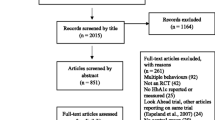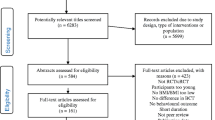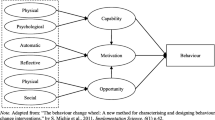Abstract
Black adults in the United States are disproportionately affected by health disparities, such as overweight and obesity. Research suggests that Black adults engage in fewer health-promoting behaviors (e.g., physical activity and healthy eating) than their non-Hispanic White counterparts. These health-promoting behaviors are known protective factors against overweight/obesity and related health concerns. This community-based participatory research study employed a waitlist control design and a university–church partnership approach to test the impact of a church-based health-empowerment program designed to increase health-promoting behaviors (called health-smart behaviors) and improve health indicators (e.g., reduce weight) among overweight/obese Black adult churchgoers. Results indicate that the intervention group (n = 37) experienced a significant increase in levels of healthy eating and physical activity and a significant decrease in weight compared to the waitlist control group (n = 33). Results from this study have implications for the design of church-based, culturally sensitive health promotion interventions to increase health-smart behaviors and ultimately prevent and reduce obesity and related diseases in Black communities.
Similar content being viewed by others
References
U.S. Department of Health and Human Services, Office of Disease Prevention and Health Promotion. Healthy People 2020: Disparities. http://healthypeople.gov/2020/about/disparitiesAbout.aspx. Accessed July 13, 2015.
Ogden CL, Carroll MD, Kit BK, Flegal KM. Prevalence of childhood and adult obesity in the United States, 2011–2012. JAMA. 2014;311:806–14.
An, R. Prevalence and Trends of Adult Obesity in the US, 1999–2012. ISRN Obes. 2014.
Danaei G, Ding EL, Mozaffarian D, Taylor B, Rehm J, Murray CJ, et al. The preventable causes of death in the United States: comparative risk assessment of dietary, lifestyle, and metabolic risk factors. PLoS Med. 2009. doi:10.1371/journal.pmed.1000058.
World Health Organization. Global health risks: mortality and burden of disease attributable to selected major risks. World Health Organization, 2009.
Vucenik I, Stains JP. Obesity and cancer risk: evidence, mechanisms, and recommendations. Ann NY Acad Sci. 2012;1271(1):37–43.
Physical Activity Guidelines Advisory Committee. Report of the physical activity guidelines advisory committee. Washington: US Department of Health and Human Services; 2008.
White KM, Terry DJ, Troup C, et al. Predicting the consumption of foods low in saturated fats among people diagnosed with Type 2 diabetes and cardiovascular disease. The role of planning in the theory of planned behaviour. Appetite. 2010;55(2):348–54.
Affuso O, Cox TL, Durant N, Allison DB. Attitudes and beliefs associated with leisure-time physical activity among African American adults. Ethn Dis. 2011;21(1):63–7.
Bovell-Benjamin A, Dawkins N, Pace R, Shikany JM. Dietary consumption practices and cancer risk in African Americans in the rural South. J Health Care Poor Underserved. 2010;21(3):57–75.
Koenig HG. Religion, spirituality, and health: the research and clinical implications. ISRN Psychiatry. 2012;2012:1–33.
Baruth M, Wilcox S, Saunders RP. The role of pastor support in a faith-based health promotion intervention. Fam Community Health. 2013;36:204–14.
Baruth M, Wilcox S, Condrasky MD. Perceived environmental church support is associated with dietary practices among African-American adults. J Am Diet Assoc. 2011;111:889–93.
Wilcox S, Parrott A, Baruth M, et al. The faith, activity, and nutrition program: a randomized controlled trial in African-American churches. Am J Prev Med. 2013;44:122–31.
Yeary KHK, Klos LA, Linnan L. The examination of process evaluation use in church-based health interventions: a systematic review. Health Promot Pract. 2012;13(4):524–34.
Bopp M, Peterson JA, Webb BL. A comprehensive review of faith-based physical activity interventions. AJLM. 2012;6(6):460–78.
Tucker CM, Butler A, Loyuk I, et al. Predictors of a health-promoting lifestyle and behaviors among low-income African American mothers and white mothers of chronically ill children. J Natl Med Assoc. 2009;101(2):103–10.
U.S. Department of Health and Human Services, National Heart, Lung, and Blood Pressure Institute. Your Guide to Lowering Blood Pressure. 2003.
Walker SN, Sechrist KR, Pender NJ. The health promoting lifestyle profile: development and psychometric characteristics. Nurs Res. 1987. doi:10.1097/00006199-198703000-00002.
Tucker CM, Rice KG, Hou W, et al. Development of the motivators of and barriers to health-smart behaviors inventory. Psychol Assess. 2011. doi:10.1037/a0022299.
National Institutes of Health, National Heart, Lung, and Blood Institute. Clinical guidelines on the identification, evaluation, and treatment of overweight and obesity in adults; the evidence report. Obes Res. 1998;6(2):51S–209S.
Ethan D, Samuel L, Basch CH. An analysis of Bronx-based online grocery store circulars for nutritional content of food and beverage products. J Community Health. 2013;38(3):521–8.
Hannon PA, Harris JR, Sopher CJ, et al. Improving low-wage, midsized employers’ health promotion practices: a randomized controlled trial. Am J Prev Med. 2012;43(2):125–33.
Bhandari A, Wagner T. Self-reported utilization of health care services: improving measurement and accuracy. Med Care Res Rev. 2006;63:217–35.
DiMatteo MR. Variations in patients’ adherence to medical recommendations: a quantitative review of 50 years of research. Med Care. 2004;4:200–9.
Currie M, King G, Rosenbaum P, Law M, Kertoy M, Specht J. A model of impacts of research partnership in health and social services. Eval Program Plann. 2005;4:400–12.
Sadler LS, Larson J, Bouregy S, et al. Community-university partnerships in community-based research. Prog Commun Health Partnerships: Res, Educ Action. 2012;6(4):463–9.
VanDevanter N, Kwon S, Sim S, et al. B free CEED coalition. Evaluation of community-academic partnership functioning: center for the elimination of hepatitis B health disparities. Prog Commun Health Partnerships: Res, Educ Action. 2011;5(3):223–33.
Acknowledgments
We would like to acknowledge PepsiCo for providing the funding to support the study reported in this manuscript. PepsiCo was not involved in the aspects of designing or conducting this study and was not involved in interpreting the results of this study or in writing this manuscript.
Author information
Authors and Affiliations
Corresponding author
Ethics declarations
Funding
The study was founded by PepsiCo (grant number 0091084). PepsiCo was not involved in project design, implementation, or data analyses.
Ethical approval
All procedures performed in studies involving human participants were in accordance with the ethical standards of the institutional and/or national research committee and with the 1964 Helsinki Declaration and its later amendments or comparable ethical standards.
Informed consent
All procedures followed were in accordance with the ethical standards of the responsible committee on human experimentation (institutional and national) and with the Helsinki Declaration of 1975, as revised in 2000 (5). Informed consent was obtained from all patients for being included in the study.
Animal studies
No animal studies were carried out by the authors of this study.
Conflict of interest
Carolyn M. Tucker, Ph.D., Guillermo M. Wippold, M.S., Jaime L. Williams, M.S.Ed., Tya M. Arthur, Ph.D., Frederic F. Desmond, Ph.D., and Karlyne C. Robinson, B.S., declare that they have no conflict of interest.
Rights and permissions
About this article
Cite this article
Tucker, C.M., Wippold, G.M., Williams, J.L. et al. A CBPR Study to Test the Impact of a Church-Based Health Empowerment Program on Health Behaviors and Health Outcomes of Black Adult Churchgoers. J. Racial and Ethnic Health Disparities 4, 70–78 (2017). https://doi.org/10.1007/s40615-015-0203-y
Received:
Revised:
Accepted:
Published:
Issue Date:
DOI: https://doi.org/10.1007/s40615-015-0203-y




